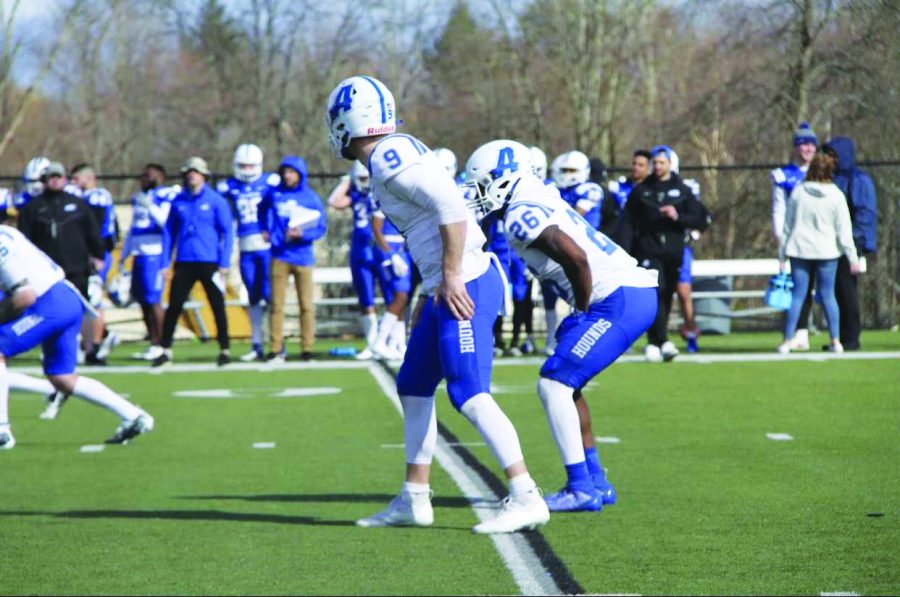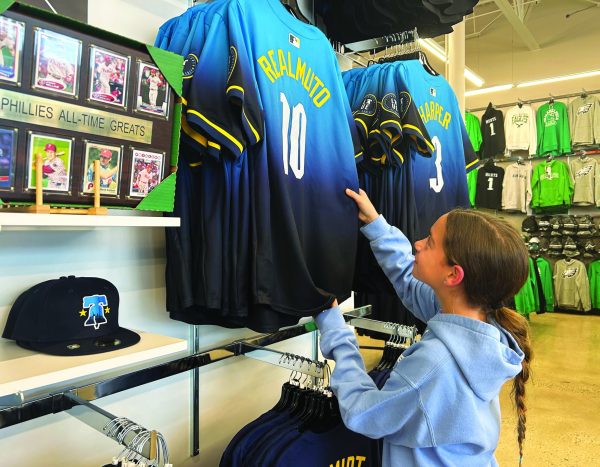Mentality takes front seat in post-high school sports
Through larger workloads and greater responsibilities, athletes’ experiences change as they work through the levels of their sport. Commitment and mentality also factor into an athlete’s experience, at any level.
Photo reprinted with permission from Jacob Cady
Touchdown in the making…Preparing for the next play, Assumption College quarterback Jacob Cady (center) and running back Raekwon Washington play in a spring scrimmage against their defense earlier this year.
In order to improve and adjust to a new level of play, athletes must change their habits, commit fully and adjust to different workloads.
With the apparent differences in professional and college athletics, people often question how professional athletes are able to reach the heights of success like they do.
According to Tampa Bay Buccaneers safety Antoine Winfield Jr., it isn’t all about physical prowess, but mentality plays a large role as well.
According to Winfield, a significant part of succeeding in the National Football League (NFL) is having a strong work ethic.
“It’s important to have that mindset that you can always get better in different areas of your game,” Winfield said.
Winfield also highlights the different lengths between college and professional football seasons.
A college football season is 10 games long, while the new NFL season is 17 games long.
According to Winfield, those extra seven games weigh greatly on players.
He described many rookie players “hitting a wall,” where they realize how long the season is, and how they have to put in effort for another seven weeks.
The point that Winfield drives home is that mentality and work ethic play a major part in the transition from college to professional sports.
While Winfield also touches on some of the physical challenges that come with playing in the NFL, he stresses the importance of a strong work ethic over anything else.
“[The mental aspect] is probably the hardest part about being in the league,” Winfield said. “Everybody’s big, everybody’s fast, everybody’s strong. Mentality is really what separates you.”
Assumption College quarterback Jacob Cady agrees.
“You have to love it. You have to wake up every day and just push through,” Cady said.
Many people would also equate playing football at both the collegiate and professional level with an overwhelming amount of stress and pressure.
However both Winfield and Cady say that when a player truly loves the game and the spirit of competition, they don’t feel the pressure.
They just want to go out and play.
According to Cady, the differences between high school and college football are substantial.
“It’s not even just in the weight room, it’s getting the right amount of sleep, you know, putting the right food in your body,” Cady said.
Cady said that his team is always striving to beat their own records and improve.
A common theme from both players is that almost all athletes at that level are strong, powerful, fast and competent at playing.
The ones that jump ahead are the ones that are willing to put in the extra effort and stay committed to the game, while still staying in shape and keeping up with their responsibilities.
If a player can’t keep up with all these different components they will be “eaten alive,” according to Cady.








